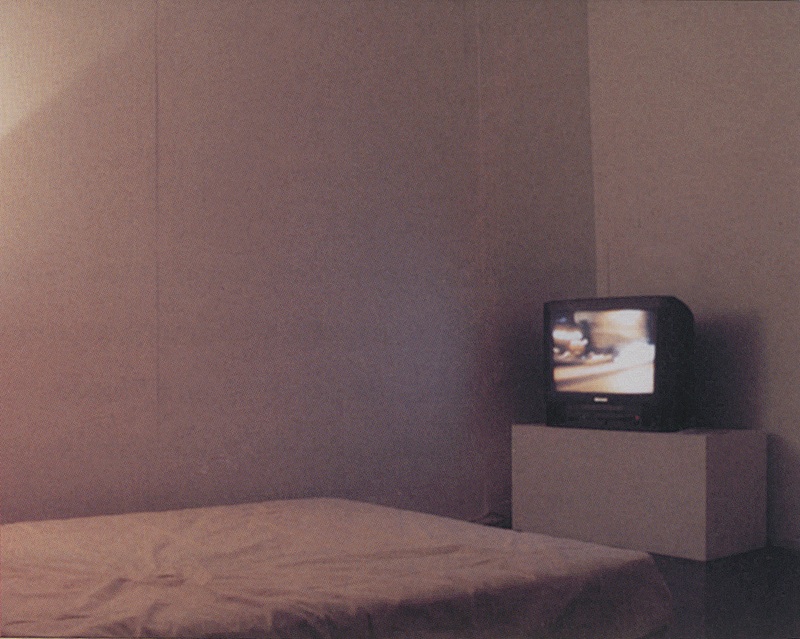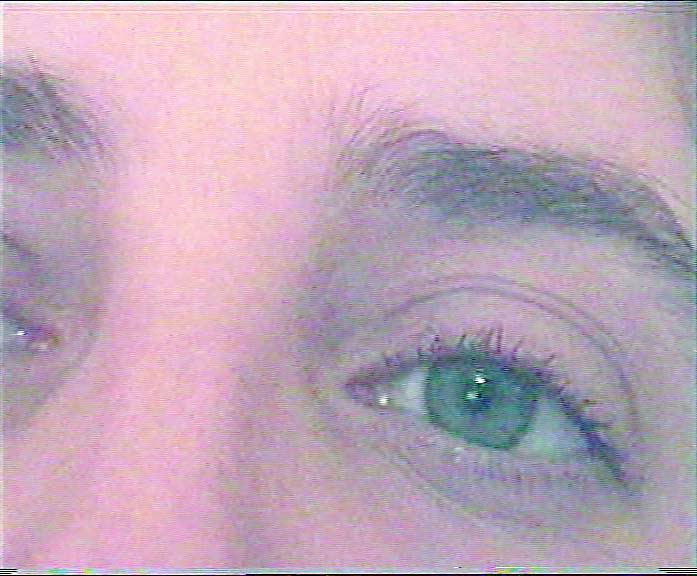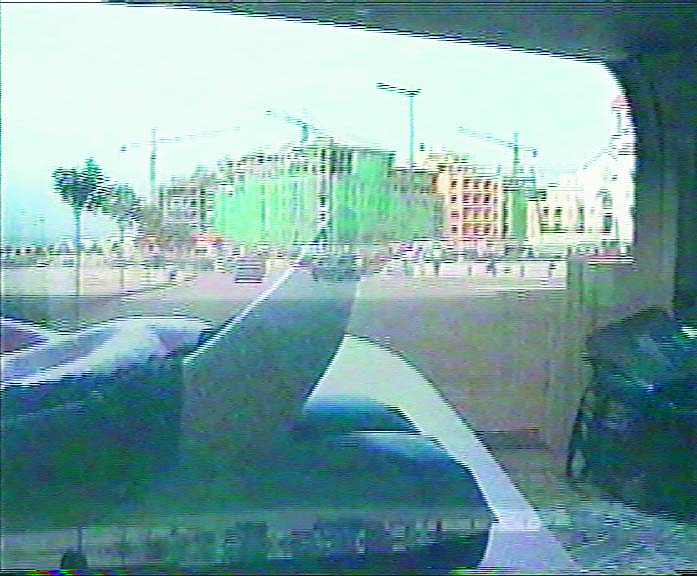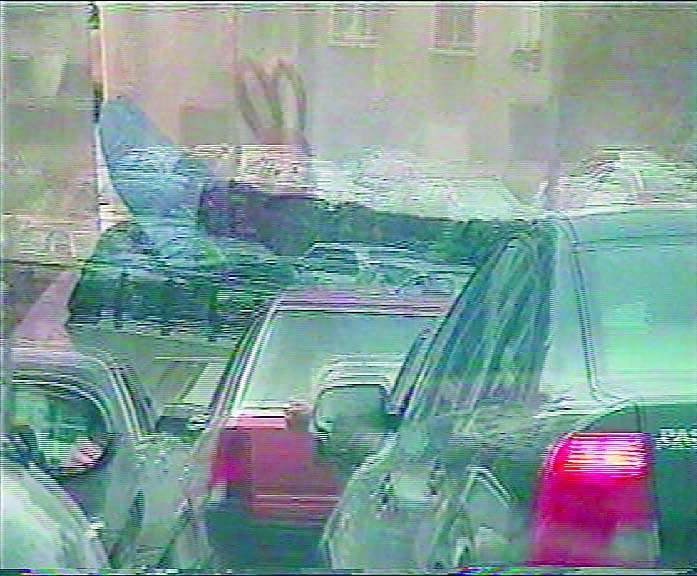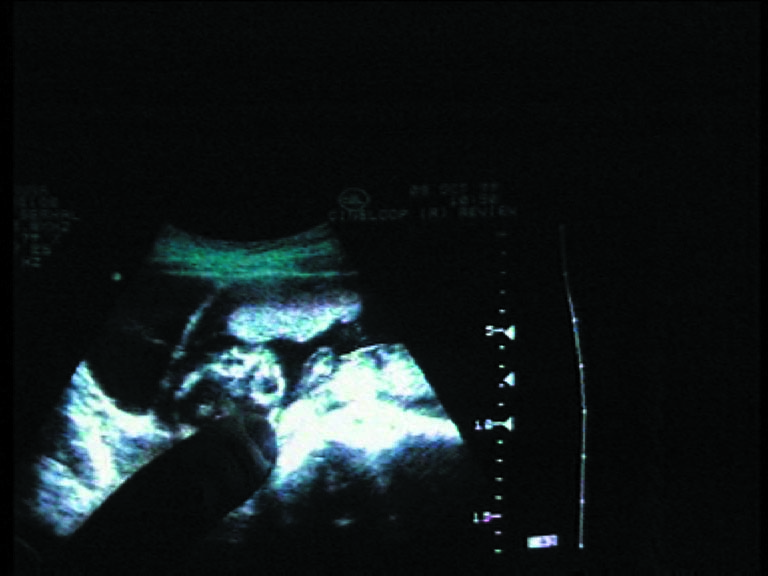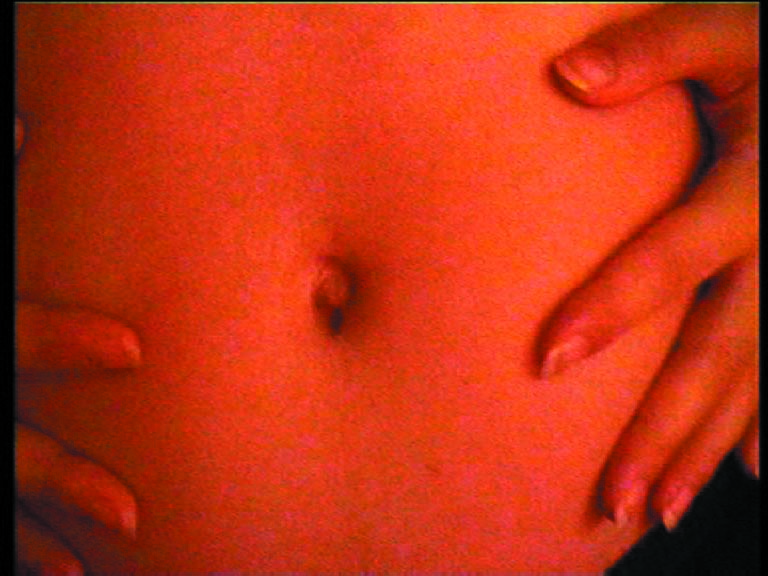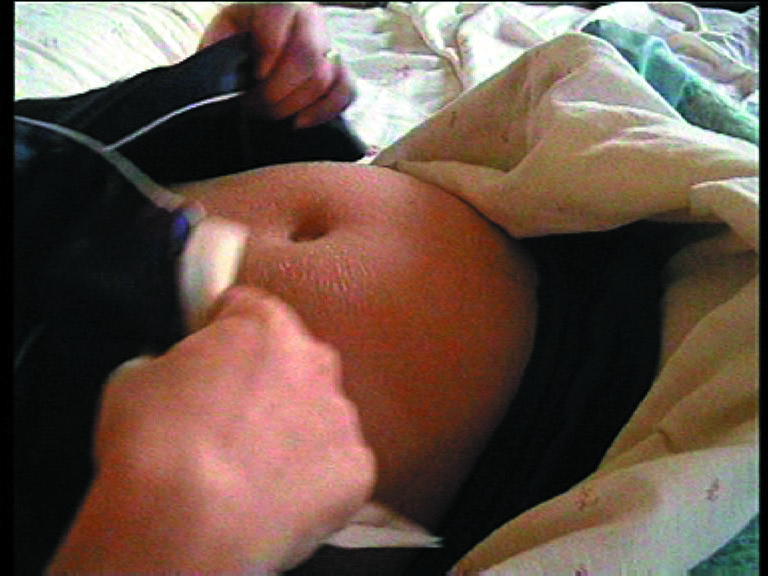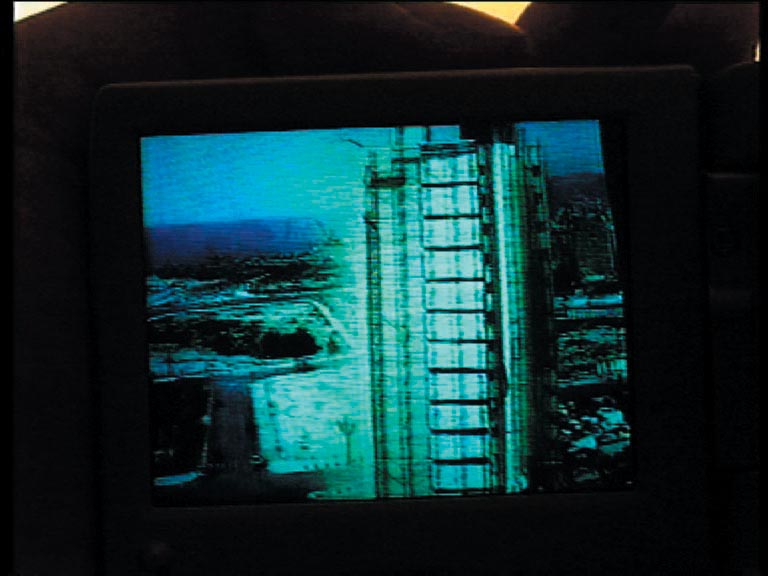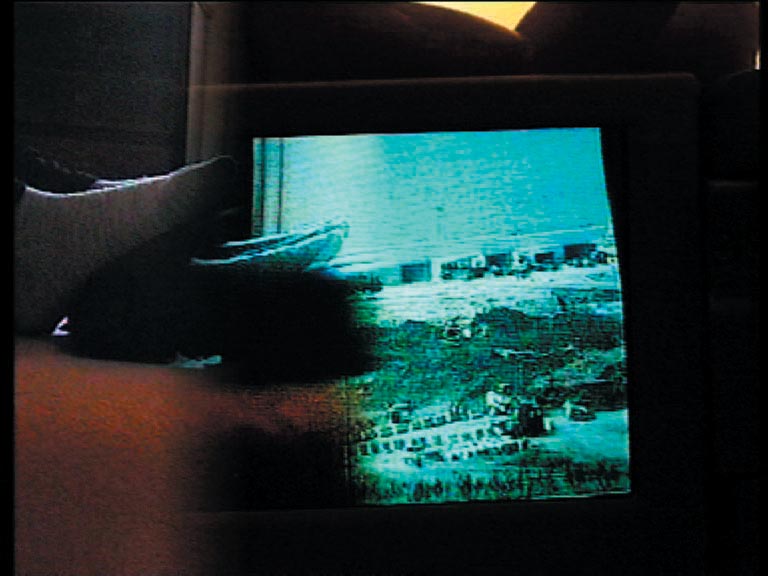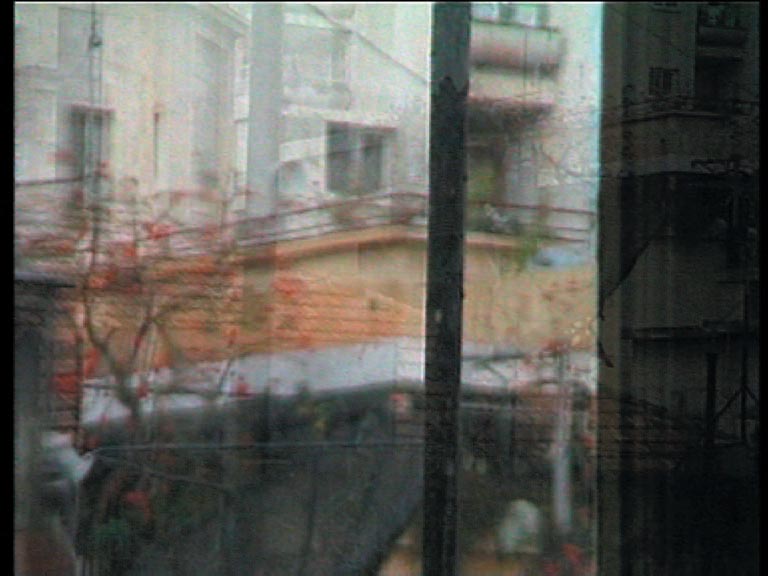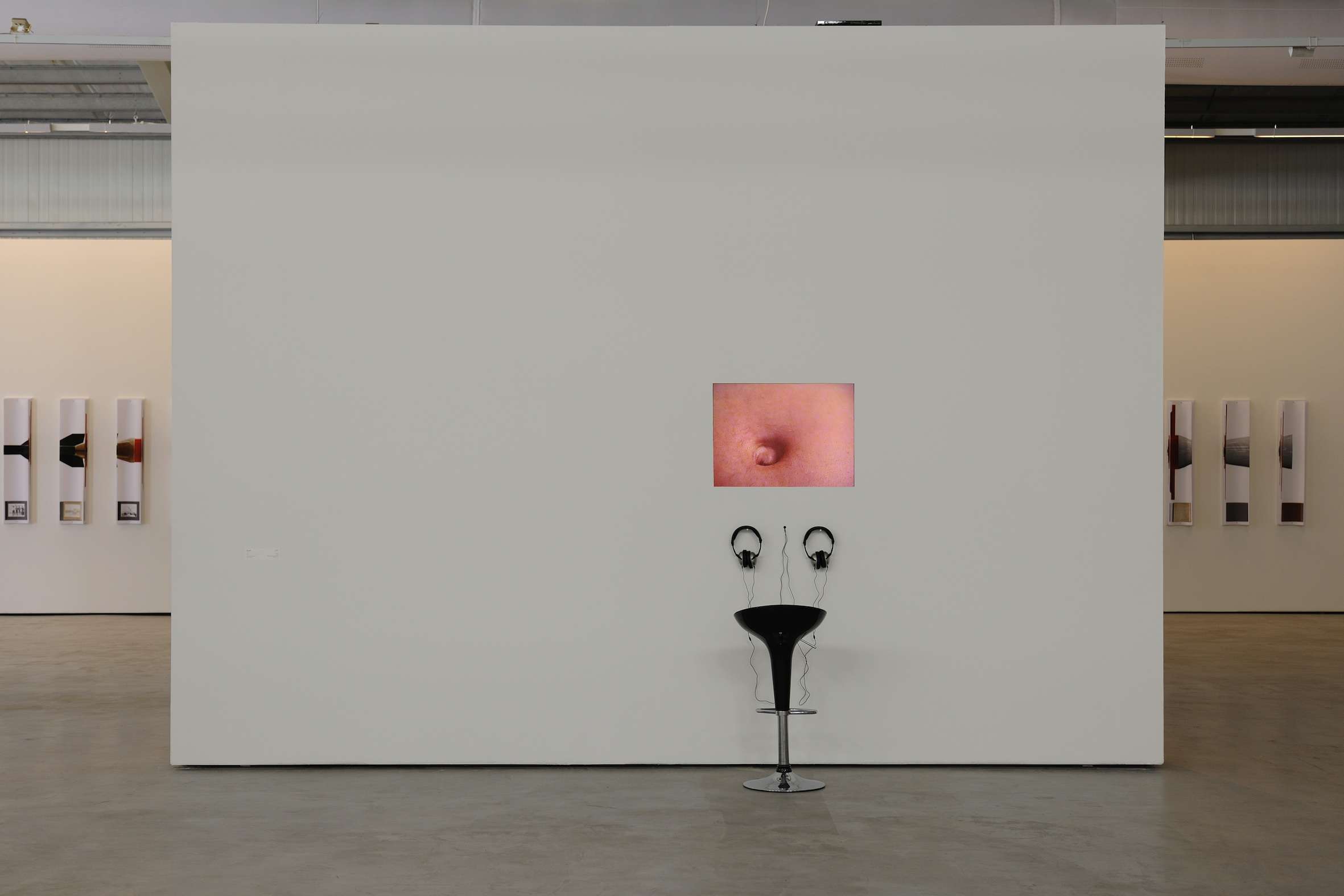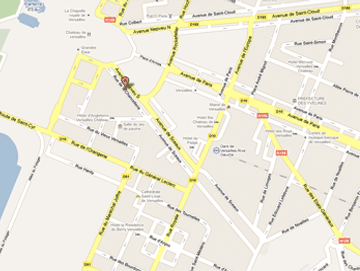Don’t Walk
- AboutDon’t Walk, 2000-2004
Mini DV, 17 min , French with English subtitles Between October 1999 and February 2000, Joana and Khalil ritually filmed moments of their lives, which never differed as much as during those days.
Joana, pregnant, has been bedridden for the last 4 months. Total immobility. - Artists textsDon’t Walk
During the last four months of my pregnancy I was bedridden, totally motionless.
In Beirut, I live in a traditional house, close to the town center. The closed world of my room is troubled only by what I can see through the two windows: Two modern buildings, their windows without shutters, like screens.
With my little camera I seek, day and night, an action, a possible meeting with my neighbors who have turned into the heroes of a daily fiction. I wait for something to happen through my windows, for a meeting, an event. I hunt the merest detail.
In my room, a fly on the window, a woman on the phone in the opposite building, a cat walking on the roof are a major event…
Outside, Beirut’s town center, under reconstruction, is the “largest building project in the world”, a desert where bulldozers and machines are active. Even the sea is invaded by concrete.
This winter is very rainy. Water seeps into my room through the cracks in the walls of this old house. We have to put pots and pans to collect all this rain. The house is no longer a real shelter, it’s an open and porous fence…
I film, I come up against the walls of the buildings facing me, against the latticed windows of the neighbors… I look, I search behind the window-screens with a sort of intoxication, I just can’t stop. But the sudden movement of my camera stumbles against things, as if it was being knocked about.
The movement breaks up, the scenes are repeated, this repetition, these recurrent themes are also part of the attempt of both of us to dialogue, an exchange of confidences.
Khalil and I are filming to be seen, to give to be seen…
The first thing I say in the film is “I can’t see anything” while the gynecologist is constantly pointing out what I am supposed to see “ You see, that’s the heart, it’s beating”, “You see, there are the two eyes, the nose”… But I can’t see.
My eye is a hole, like my navel or the crack in the wall through which the water seeps… a hole through which I don’t see much…
I try to catch the apparently nothing, a nothing that, to me, contains everything, a metonymy. A little of what Roland Barthes calls “the Neutral”, etymologically “neither one, nor the other”, nor really informative, narrative or symbolic, the “obtuse”, hidden sense which always escapes itself, “the third sense”.
To get through that period, I have reduced time to the present, to the instant. I have tried to forget the existence of the exterior. It is abstracted. Life is concentrated in my room. It has become the center, the center of the world.
Joana Hadjithomas
To me, “Don’t walk” is a huge black hole. I have few images of that period, there’s a kind of blackout with vague memories. However, between October 1999 and February 2000, Joana and I filmed permanently and ritually moments of our lives, which never differed as much as during those days. Joana pregnant, lying on her bed, motionless, for months on end and myself, obviously disturbed by our situation but up and about, moving…
What could we share? Images, or rather, more precisely, our relation to images, alternate journals, mingled ones, with all sorts of correspondences, in which we sent each other our images through our videos: “ I see, I show you”. “You see, you show me”.
There is a crossing of our momentums. There is a movement in Joana, a minimal one, which goes from the inside to the outside then turns back inside. She has only two axes on the same horizontal plane which she examines to grasp every detail.
And I film a more ample movement, a flow, and attempt to bring back the town into her cell; but it is a world she’d rather forget since she can’t share in it. I show her another gestation, obscene, pornographic, that of an already monstrous town, a town under reconstruction, which has always interested us, which we have always questioned in its artistic and political representations, in our own representations, a town which inhabits us….
I believe I can bring back to Joana life with my camera, but she goes on scrutinizing her interior, her reality. It all happens inside, not outside. Images filmed from inside have a different power; the external ones pale in comparison.
Although Joana’s movement is frenetic, it has a center, it is anchored, it holds to the navel. My movement is just as frenetic but it is lost in agitation, it retains nothing. Nothing happens here. Because of the way I walk around the town, it’s difficult for me to film what is spectacular, it’s too big. I don’t have enough distance, there’s no longer any scale… I’m lost in this convulsion and returning to Joana is necessary for us to be able to to find and recognize ourselves.
After the flow comes the just as important transformation of the infinitely small, of subtlety. Joana feeds my vision but I falter once more, I attempt to see what is not visible, I cannot really share her life experience.
I’ve often thought that this new adventure had transformed my own vision as a film maker, that it had been a reeducation in learning how to view things, how to scrutinize them to find the hidden sense which is often overlooked because it is considered as small, minute. Stop looking to begin seeing.
Khalil Joreige - Other video works
With her small DV camera, she looks night and day for some action, for a slightest detail, for something to happen in her room or through her windows, some possible contact with her neighbours who become the heroes of a daily fiction.
Khalil films aflow, movement, the outside. He tries to bring the city into her room. But which city ?
They attempt to share images, or rather, more precisely, their relation to images. Alternate journals, mingled with all sorts of correspondences, reflexions on the outside and the inside….

